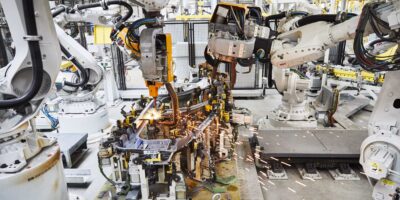ŠKODA AUTO is forging ahead with decarbonising the company, supported by a holistic action plan under the NEXT LEVEL – ŠKODA STRATEGY 2030. In addition to accelerating the ramp-up of electromobility, the focus is on sustainably producing and operating battery-electric vehicles, including supply chains. To achieve this, ŠKODA is committed to using, for example, recyclable materials in its cars and consistently recycling the high-voltage batteries from e-vehicles.
Sustainability at the heart of the NEXT LEVEL – ŠKODA STRATEGY 2030
The car manufacturer has defined sustainability as a key area of its NEXT LEVEL – ŠKODA STRATEGY 2030 and has set itself ambitious targets to effectively reduce the CO2 footprint of its business activities along the entire value chain. Over the past year, ŠKODA AUTO’s investments in this area – along with comprehensive, transparent communication on the topics of environment, social affairs, governance and finance – have helped the Volkswagen Group to become the first automotive company in the world to meet the reporting requirements of the European Union’s Sustainable Finance Action Plan and the EU Taxonomy.
Sustainable material cycle and second life cycle for batteries
ŠKODA AUTO is increasingly opting for natural, recycled and recyclable materials such as those used in the ŠKODA VISION 7S concept car. In addition to metals and glass, recycled plastics are already being incorporated into new vehicles. In the ŠKODA ENYAQ iV, for example, the seat covers are made of recycled PET bottles. The next steps involve composite materials made from plastic and fibres from sugar beet or the reed plant Miscanthus.
The use of rice husks, hemp, cork and coconut fibres is also being researched. ŠKODA is deploying used high-voltage batteries from electric vehicles in stationary energy storage systems before they are recycled. This second life cycle effectively reduces the batteries’ CO2 footprint.
Climate-neutral operation of e-vehicles
ŠKODA AUTO’s holistic approach to sustainability not only includes CO2-neutral production but also running electric cars with virtually zero emissions. ŠKODA ENYAQ iV cars are already delivered to customers with a carbon-neutral balance sheet. ŠKODA AUTO compensates for currently unavoidable CO2 emissions during production by purchasing certified carbon credits. In addition, the company is supporting the expansion of renewable energy sources in Europe. For example, the car manufacturer is involved in constructing a new wind farm in Finland. With a calculated energy volume of 570 GWh per year, the plant will produce enough green energy in the future to supply around 150,000 households with electricity – or power ŠKODA electric vehicles with zero local emissions.
Newly established External Sustainability Council with international experts
ŠKODA AUTO established its own External Sustainability Council in November 2021. The external, independent panel consists of five internationally renowned experts who advise the Board of Management on the implementation of planned sustainability measures and also provide new perspectives, impetus and approaches. This makes the car manufacturer one of the first companies in the Czech Republic to draw on the expertise of its own committee in this area.
Additional sustainability activities
On its path towards greater sustainability, ŠKODA is systematically involving its 3,200 retailers worldwide. Alongside GreenRetail in the retail sector, GreenProduct focuses on vehicles that are as environmentally friendly as possible, and GreenFactory is dedicated to sustainable production.
The company’s sustainability measures build on the Volkswagen Group’s environmental mission statement ‘goTOzero’. The policy encompasses the topics of climate change, resources, air quality and environmental compliance.
As part of this, the #Project1Hour initiative calls on the Volkswagen Group’s 660,000 employees to consider their own contribution to sustainability and climate protection to mark Earth Day each year on 22 April. In 2022, employees of ŠKODA AUTO and its subsidiaries SAVWIPL India as well as ŠKODA AUTO UK and ŠKODA AUTO Germany took part in the campaign.
Materials: Environmentally friendly and recyclable
Almost one-third of the materials in the current ŠKODA OCTAVIA are recycled
Homogeneous and biodegradable materials can be used several times over
New materials obtained from waste play an increasingly important role
Using recyclable materials, and preferably materials that have already been recycled once, is crucial to the sustainability of cars. This applies to a vehicle’s body and chassis as well as its interior. According to EU Directive 2005/64/EC, at least 85% of a vehicle’s weight must be recyclable and a further ten per cent recoverable at least in terms of energy. ŠKODA AUTO exceeds these requirements and is working within the Volkswagen Group on recovering more than 95% of the material and reusing it in-house.
Johannes Neft, ŠKODA AUTO Board Member for Technical Development, says: “Being able to almost completely recycle a car is an ideal scenario for a sustainably oriented manufacturer. At ŠKODA and in the Volkswagen Group, we have set ourselves the goal of recovering more than 95%, significantly more than the EU target of 85%. What we want above all is to reuse as many of the recycled materials as possible ourselves and keep them in a cycle. That’s why we are continuously researching even more efficient recycling processes and new materials, preferably from natural, renewable sources or even waste products.”
At the end of its life cycle, a vehicle is disassembled so that as many of its components as possible can be recycled. Metals are used to produce new steel and aluminium for new castings. Waste glass is turned into new panes or insulating material made of fibreglass. Plastics can be transformed into new everyday products such as clothes hangers or flower pots. Currently, around half of the material is extracted using pyrometallurgical technology in collaboration with external recycling companies. ŠKODA is also increasingly using recycled feedstock in constructing new vehicles; at present, almost one-third of the materials in a ŠKODA OCTAVIA are recycled. In addition to steel, aluminium and glass, these include plastics and insulation materials, for example, for underbody panelling, wheel arch liners and boot mats.
*Article Source http://www.skodamedia.com








